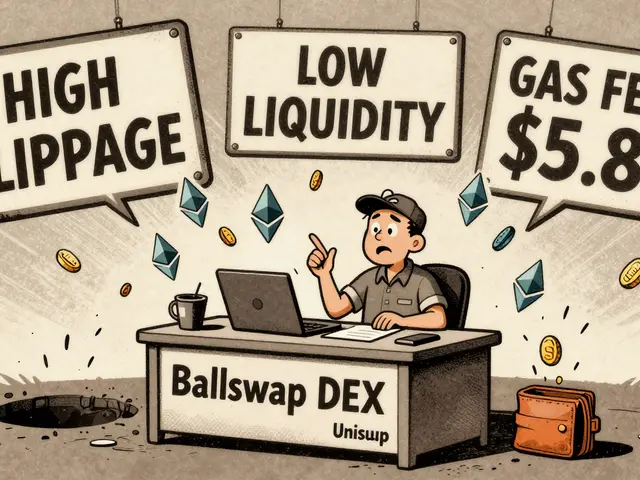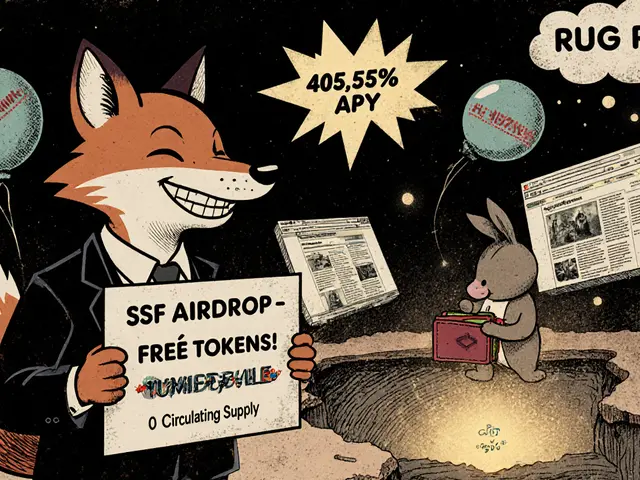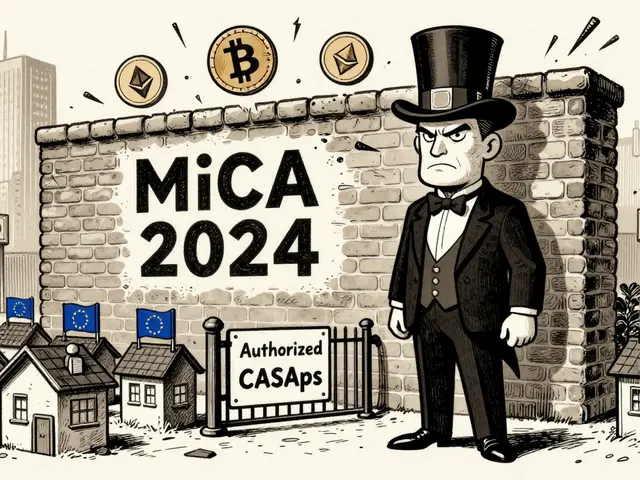
OpenDEX Risk Assessment Tool
Compare OpenDEX against well-established exchanges to understand the differences:
Uniswap (Decentralized)
- Transparent fee structure: 0.30% per swap
- Open-source code
- High trading volume ($1.2B avg)
- Regular security audits
Kraken (Centralized)
- Regulated by FinCEN
- Tiered fees: 0.00–0.26%
- Annual security audits
- 24/7 support
Coinbase (Global)
- SEC registered
- Tiered fees: 0.00–0.50%
- SOC 2, ISO-27001 compliance
- 24/7 phone support
In this OpenDEX review, we separate hype from reality and show why the platform is flagged by regulators, industry experts, and everyday traders alike. If you’re thinking about depositing funds, you’ll get a clear picture of the exchange’s background, how it measures against reputable services, and the concrete red flags that suggest you should stay away.
Key Takeaways
- OpenDEX is not listed in any reputable exchange rankings and lacks verifiable technical documentation.
- User reports on Revain and DFPI’s Crypto Scam Tracker consistently describe unexpected fees and blocked withdrawals.
- Unlike decentralized giants like Uniswap is a leading Ethereum‑based decentralized exchange with over $4billion TVL, offering transparent fee structures and open‑source code., OpenDEX provides no public data on trading volume, fee schedules, or security measures.
- Regulatory compliance is absent; the platform does not appear in any Know‑Your‑Customer (KYC) or anti‑money‑laundering (AML) registries.
- Given the lack of transparency, the safest move is to avoid OpenDEX and choose a well‑established exchange.
What Is OpenDEX?
OpenDEX is a cryptocurrency exchange platform that has garnered significant negative attention due to reliability and regulatory concerns. The service marketed itself as an "incredible password currency exchange," promising easy access to dozens of crypto pairs. However, by late 2024 the narrative shifted: multiple user reviews flagged the platform for sudden fee demands, inaccessible withdrawals, and poor customer support.
How OpenDEX Stacks Up Against Established Exchanges
To understand the gap, compare OpenDEX with three market leaders that meet industry best‑practice standards: Uniswap (decentralized), Kraken (centralized, U.S. regulated), and Coinbase (global, public‑listed).
| Feature | OpenDEX | Uniswap | Kraken | Coinbase |
|---|---|---|---|---|
| Regulatory registration | None documented | Decentralized - no registration | FinCEN‑registered, DFPI compliant | SEC‑registered, global licences |
| Transparent fee schedule | Not disclosed | 0.30% per swap | 0.00-0.26% tiered | 0.00-0.50% tiered |
| Trading volume (30‑day avg.) | Unreported | $1.2B | $4.9B | $5.8B |
| Security audits | None publicly listed | Open‑source audits (multiple firms) | Annual SOC2, third‑party audits | SOC2, ISO‑27001, regular pen‑tests |
| User support channels | No live phone, limited email | Community forums, Discord | 24/7 live chat, phone | 24/7 phone, chat, help centre |
| Known scams/alerts | Flagged by DFPI, Revain negative reviews | None | None | None |
The table makes it clear: OpenDEX falls short on every measurable benchmark used by serious traders and regulators.

Red Flags Reported by Users and Regulators
Multiple sources converge on the same story. Revain is a review platform that aggregates user feedback for crypto services. As of September2025, Revain’s exchange reviews label OpenDEX as "not considered a reliable platform for crypto exchange" and cite repeated complaints about withdrawal blocks and hidden fees. The California Department of Financial Protection and Innovation (DFPI) maintains a Crypto Scam Tracker that documents patterns like “multiple unexpected fees before funds can be withdrawn.” OpenDEX matches this pattern exactly, according to the DFPI’s September2025 update.
Typical user experiences include:
- Being asked to pay a “maintenance fee,” a “KYC fee,” and a “platform fee” before any withdrawal is processed.
- Emails from support that go unanswered for weeks, with no phone line to call.
- Sudden account lockouts after depositing, leaving users unable to access their assets.
These behaviors are textbook signs of a pig‑butchering scam, where the platform pretends to be legitimate, collects funds, then disappears or becomes unresponsive.
Technical and Security Gaps
Legitimate exchanges publish detailed whitepapers, API documentation, and security audit reports. For example, dYdX openly details its Layer‑2 Ethereum architecture and order‑book mechanics, providing transparent code repositories. In contrast, OpenDEX offers no verifiable technical specifications. No public smart‑contract addresses, no audit certificates, and no clear statement about which blockchain it operates on.
This opacity makes it impossible to evaluate:
- Risk of smart‑contract bugs or backdoors.
- How user private keys are stored (custodial vs. non‑custodial).
- Whether the platform complies with industry‑standard security practices such as multi‑signature wallets or cold storage.
Without this data, traders cannot assess whether their funds are safe.
Regulatory and Compliance Status
Regulatory compliance is a baseline requirement for any exchange that wants to operate long‑term. Koinly is a crypto tax and analytics platform that tracks exchanges for compliance reporting and regularly publishes a vetted list of reputable DEXs and CEXs. OpenDEX does not appear in Koinly’s 2025 expert‑reviewed list of top decentralized exchanges, nor does it feature in any AML or KYC registries.
The DFPI’s Crypto Scam Tracker explicitly warns consumers about platforms that demand “multiple unexpected fees” - a pattern identical to OpenDEX’s user reports. The lack of any licensing information, no public transparency reports, and absence from global regulator lists (e.g., FCA, ASIC) suggest the platform operates outside legal frameworks.
Should You Use OpenDEX?
Putting the pieces together:
- No verifiable technical data or security audits.
- Consistent negative user feedback and regulator warnings.
- Zero presence in reputable exchange rankings (Koinly, NerdWallet, CryptoCompare).
- Opaque fee structure and blocked withdrawals.
All signs point to a high‑risk operation that does not meet basic industry standards. If you value the safety of your crypto assets, steer clear of OpenDEX and choose a platform that provides clear documentation, regulatory compliance, and a proven track record - such as Uniswap for decentralized exposure or Kraken/Coinbase for a regulated custodial experience.
Next Steps for Readers
- Audit your accounts: If you already have funds on OpenDEX, document transaction IDs and attempt a withdrawal immediately.
- Gather evidence: Screenshot fee demands and any support correspondence; this can help if you need to file a complaint with the DFPI.
- Consider a safe exit: Transfer assets to a reputable wallet (e.g., Ledger, MetaMask) or to a verified exchange.
- Report scams: File a complaint with your local consumer protection agency and with the DFPI’s Crypto Scam Tracker.
- Educate yourself: Use resources like NerdWallet offers detailed guides on evaluating crypto exchanges, covering fee transparency, security, and regulatory status.
Frequently Asked Questions
Is OpenDEX a legitimate exchange?
No. Multiple regulator alerts, negative user reviews, and the lack of any public technical or compliance information indicate that OpenDEX is not a trustworthy platform for trading or storing crypto.
What fees does OpenDEX charge?
OpenDEX does not publish a transparent fee schedule. Users report being asked to pay a platform fee, a KYC fee, and a maintenance fee before withdrawals are allowed, which is a common scam pattern.
Can I trust the security of my funds on OpenDEX?
Security cannot be verified because the platform provides no audit reports, no information on private‑key handling, and no public smart‑contract addresses. This lack of transparency is a major red flag.
How do I withdraw my assets if I’m already on OpenDEX?
Attempt the withdrawal immediately and document any fee requests or error messages. If the platform blocks the transaction, gather evidence and file a complaint with the DFPI’s Crypto Scam Tracker and your local consumer protection agency.
Which exchanges are safe alternatives?
For decentralized exposure, Uniswap and PancakeSwap have open code, transparent TVL metrics, and community audits. For custodial services, Kraken and Coinbase provide regulatory licenses, clear fee tables, and 24/7 support.





Comments (19)
Ali Korkor
Just saw this and wanted to say: if you're even thinking about putting money into OpenDEX, stop. Right now. Walk away. There's zero reason to risk it when Kraken and Coinbase are right there, safe and sound. Your crypto deserves better than mystery fees and ghost support.
madhu belavadi
lol i tried to withdraw last week. they asked for $200 in 'KYC verification' then disappeared. my funds are gone. this is a classic pig butchering scam. don't be the next one.
Dick Lane
I've seen this pattern before with fake exchanges. No audits, no transparency, sudden fees before withdrawals - it's always the same script. I wish more people knew how predictable these scams are. You don't need to be a genius to spot this one.
Norman Woo
they say open dex is a decoy for the fed to track crypto users... think about it. why would a legit exchange have zero public code? why no audits? they're not trying to make money - they're trying to collect wallet addresses. this is surveillance disguised as trading.
Serena Dean
Hi everyone - if you're new to crypto, please don't let this scare you off the whole space. OpenDEX is a scam, yes, but real platforms like Uniswap, Kraken, and Coinbase are totally different. They're regulated, audited, and have real teams behind them. Stick with those. You're safe there.
James Young
Anyone who still considers using OpenDEX after reading this deserves to lose their money. You don't need a degree in blockchain to understand that if a platform hides its fees and has zero audits, it's a dumpster fire. Stop being lazy and do basic research. This isn't rocket science.
Chloe Jobson
Regulatory absence + opacity + withdrawal blocks = textbook exit scam. The DFPI and Revain flags are the reddest of red flags. I've reviewed 40+ crypto platforms this year - this one is at the top of the danger list. Avoid like plague.
Andrew Morgan
Man I remember when crypto was about freedom and open access. Now it's just a minefield of sketchy platforms pretending to be legit. OpenDEX? Nah. I'd rather use a decentralized exchange with a public GitHub than some anonymous site asking for 'maintenance fees.' Keep it real, folks.
Michael Folorunsho
Why are Americans so gullible? In Europe and Asia, we know better. No regulation? No license? No audit? That's not an exchange - that's a Ponzi dressed in crypto jargon. If you're using this platform, you're not a trader - you're a target. Get educated or get out.
Roxanne Maxwell
Thank you for writing this. I almost deposited $5k last month because I thought 'maybe it's new and legit.' I'm so glad I checked reviews first. This is exactly the kind of warning the crypto space needs - clear, calm, and factual. You saved me.
Jonathan Tanguay
Let me break this down for the slow ones - OpenDEX has no smart contract address published, no audit report from any reputable firm like CertiK or SlowMist, no public team members, no domain history beyond 2023, and the website code is obfuscated. That's not just shady - that's malicious. They're not even trying to hide it. This is a honeypot. Don't touch it. Ever. I've seen this exact setup before on Telegram scams - same playbook. Same outcome. Same wallet drained.
Ayanda Ndoni
ehhh i don't know man. maybe it's legit? i mean, why would they even make a site if they were gonna scam people? maybe they just suck at marketing? i deposited $500 and i'm chillin'...
Elliott Algarin
It's sad how much trust we put into systems that don't earn it. We want to believe in innovation, in decentralization - but when the foundation is built on silence and secrecy, it's not innovation. It's illusion. OpenDEX doesn't represent the future of finance. It represents its decay.
John Murphy
did anyone check the whois record for opendex.io? domain registered 6 months ago with private info and hosted in a data center that's mostly used by phishing sites. that's not a coincidence.
Zach Crandall
It is my professional opinion - as a compliance officer with over 15 years in financial services - that OpenDEX exhibits all the hallmarks of a structured fraud operation. The absence of regulatory registration, coupled with the documented pattern of post-deposit fee extraction, constitutes a prima facie case of financial deception under both U.S. and international anti-fraud statutes. The platform's operational structure is not merely non-compliant - it is deliberately constructed to evade accountability. I urge all individuals to treat this entity as a criminal instrument, not an exchange.
Akinyemi Akindele Winner
yo, open dex? nah bro. that's a ghost ride. i seen this before in Lagos - they call it 'crypto masquerade.' you give them your coin, they vanish like smoke. next thing you know, your wallet's empty and their site's down. i'm out. no cap.
Patrick De Leon
Irresponsible to label a platform as fraudulent without conclusive forensic analysis. The burden of proof lies with the accuser. Until the blockchain ledger is independently audited and transaction trails are verified, this is mere speculation. We must not succumb to mob mentality disguised as journalism.
MANGESH NEEL
OpenDEX is a cancer on the crypto ecosystem. It preys on the naive, the greedy, and the lazy. People who fall for this don't deserve to hold crypto - they deserve to learn the hard way. Every time someone deposits into a platform like this, it makes the whole space look bad. You're not a pioneer - you're a liability. And you're feeding the sharks that will eat your future. Wake up. Or get eaten.
Sean Huang
what if this whole thing is a psyop to discredit decentralized finance? think about it - who benefits from scaring people away from new platforms? big banks? the SEC? they want you stuck on Coinbase where they can track every move. maybe OpenDEX is the real thing and they're painting it as a scam to kill competition. i'm not saying it's safe - i'm saying maybe the truth is being buried